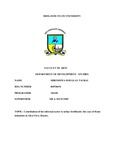Please use this identifier to cite or link to this item:
https://cris.library.msu.ac.zw//handle/11408/2825Full metadata record
| DC Field | Value | Language |
|---|---|---|
| dc.contributor.author | Mhondiwa, Douglas Taurai | - |
| dc.date.accessioned | 2017-09-06T14:58:04Z | - |
| dc.date.available | 2017-09-06T14:58:04Z | - |
| dc.date.issued | 2015 | - |
| dc.identifier.uri | http://hdl.handle.net/11408/2825 | - |
| dc.description.abstract | Informal sector has become the main source of urban livelihoods through employment creation due to shrinking formal sector. The government of Zimbabwe has embarked on major socio –economic transformation through supporting the informal sector in an endeavor to improve urban livelihoods. In this context, this research sought to examine the contribution of the informal sector to urban livelihoods. Specific focus was on the home industries in Glen – View. The study mainly used the qualitative research methods in order to get a deeper understanding of how the informal sector is contributing to livelihoods. Interviews were conducted with twenty key informants drawn from the local council, Ministry of Small and Medium Enterprises, Academics, Informal Traders, Home Industry Management Committee and other suitable stake holders who had intimate knowledge about the informal sector operations. Ninety questionnaires were administered to the community of informal traders in Glen – View Home Industries in wards 30 and 32. Data that emerged from the findings was analyzed and presented using the descriptive thematic approach which was analyzed using the statistical package for social sciences (SPSS). The findings of the study reveal that informal sector has a lot of potential to contribute to improved livelihoods through employment creation, supplementing incomes, upward mobility, enhancing the standard of living and fighting poverty. However, the findings of the study reveal that a number of challenges militate against operations of the informal sector such as funding, poor working environments and lack of social services. This means there is a serious need for concerted efforts by all stakeholders to ensure that the informal sector activities are fully supported to ensure that full benefits in terms of the contribution of the informal sector in sustaining urban livelihoods is not interrupted. | en_US |
| dc.language.iso | en | en_US |
| dc.publisher | Midlands State University | en_US |
| dc.subject | Informal sector | en_US |
| dc.subject | Urban Livelihoods | en_US |
| dc.subject | Home industries | en_US |
| dc.title | Contribution of the informal sector to urban livelihoods: the case of Home industries in Glen-View, Harare | en_US |
| item.fulltext | With Fulltext | - |
| item.languageiso639-1 | en | - |
| item.grantfulltext | open | - |
| Appears in Collections: | Master Of Arts In Development Studies | |
Files in This Item:
| File | Description | Size | Format | |
|---|---|---|---|---|
| MHONDIWA DOUGLAS.pdf | Full Text | 1.41 MB | Adobe PDF |  View/Open |
Page view(s)
100
checked on Apr 10, 2025
Download(s)
86
checked on Apr 10, 2025
Google ScholarTM
Check
Items in MSUIR are protected by copyright, with all rights reserved, unless otherwise indicated.



